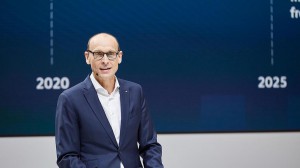Following in the footsteps of some American automakers, Volkswagen AG is preparing to trim costs by eliminating thousands of jobs in face of a slowing European economy, and profits across the industry begin to slip while the high cost of shifting to electric vehicles and self-driving cars adds up.
The German carmaker said Wednesday it will eliminate as many as 7,000 positions – with measures including early retirement and not filling vacant positions – to achieve an annual profit gain of 5.9 billion euros $6.7 billion starting in 2023.
GM recently cut 4,000 white-collar job and plans to close five plants while Ford is in the midst of an $11 billion restructuring plan that will include cutting a slew of salaried personnel, plus the announced closure of its plant in Brazil, resulting 2,700 losing their jobs.
“We will significantly step up the pace of our transformation so as to make Volkswagen fit for the electric and digital era,” VW brand COO Ralf Brandstaetter told reporters in Germany.
(VW expects to sell 22 million EVs over next decade. Click Here for the story.)
The VW car brand, which accounts for about half of the group’s global deliveries, employs about 185,000 workers out of a total workforce of 650,000 and it is continuing to feel the aftershocks of diesel emission scandal. In addition, VW has not made a profit in North America in years, losing money again in 2018. It is expected to lose money again this year in North America.
Return on sales for VW’s namesake brand last year fell to 3.8% from 4.2% because of higher spending on future electric models and production bottlenecks triggered by stricter emission rules in Europe.
Labor costs are a “big concern” that risk derailing a much-needed streamlining of operations, VW Chief Executive Officer Herbert Diess told investors on Tuesday. Diess, who also heads up the VW brand, has been axing slow-selling models and car variants to reduce complexity. Further measures will include lowering material costs and lifting productivity at its factories by 5% to achieve an operating profit margin of 6% in 2022.
(Click Here to see more about VW’s $800 million EV plant coming to Chattanooga.)
Chief Financial Officer Arno Antlitz acknowledged that while the company has “higher goals” that reflect its superior scale compared to smaller, more profitable rivals like PSA Group, VW was sticking to the 6% target “in the mid-term” as the cost for the looming industry transformation weighs on earnings.
VW signed a labor agreement in 2016 that cleared the way to eliminate as many as 30,000 jobs worldwide and generate about 3 billion euros in annual savings. The brand has achieved 2.4 billion euros in savings so far and a net reduction of more than 6,300 positions, despite adding 2,700 jobs including in software operations, VW said Wednesday. “We are on track,” Brandstaetter said.
VW will start producing the first model of its all-electric I.D. car range toward the end of this year. Order books for the electric I.D. hatchback open on May 8, and sales chief Juergen Stackmann said feedback from dealers is so strong that the model might be sold out before its official presentation in September.
(To check out the VW I.D. Dune Buggy concept, Click Here.)
“Our goal is to become the world’s number one in e-mobility by 2025,” Brandstaetter said. The brand plans to bring to market more than 20 vehicles based on the I.D.’s fully electric platform.


Cancelling vacant positions won’t save $1.